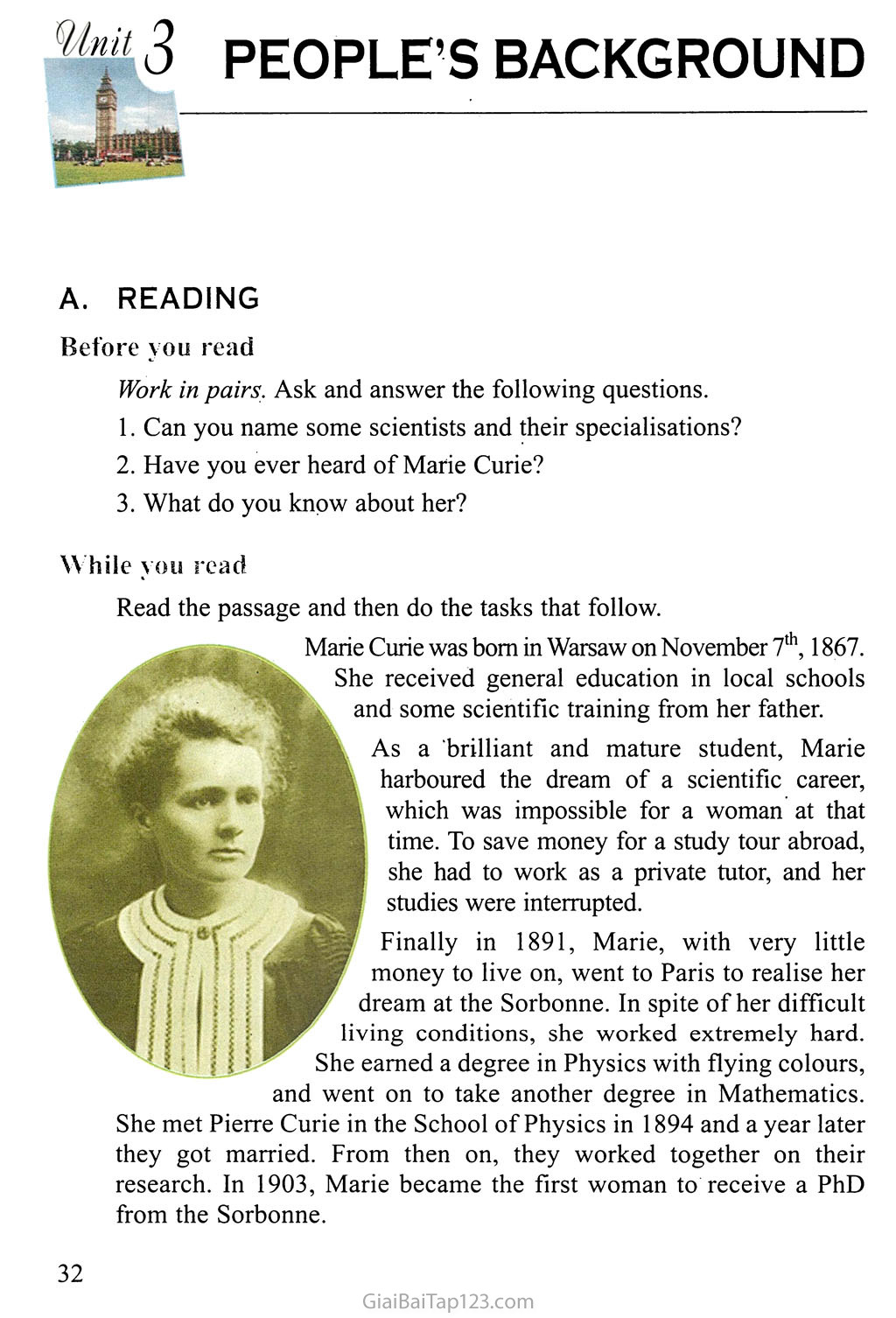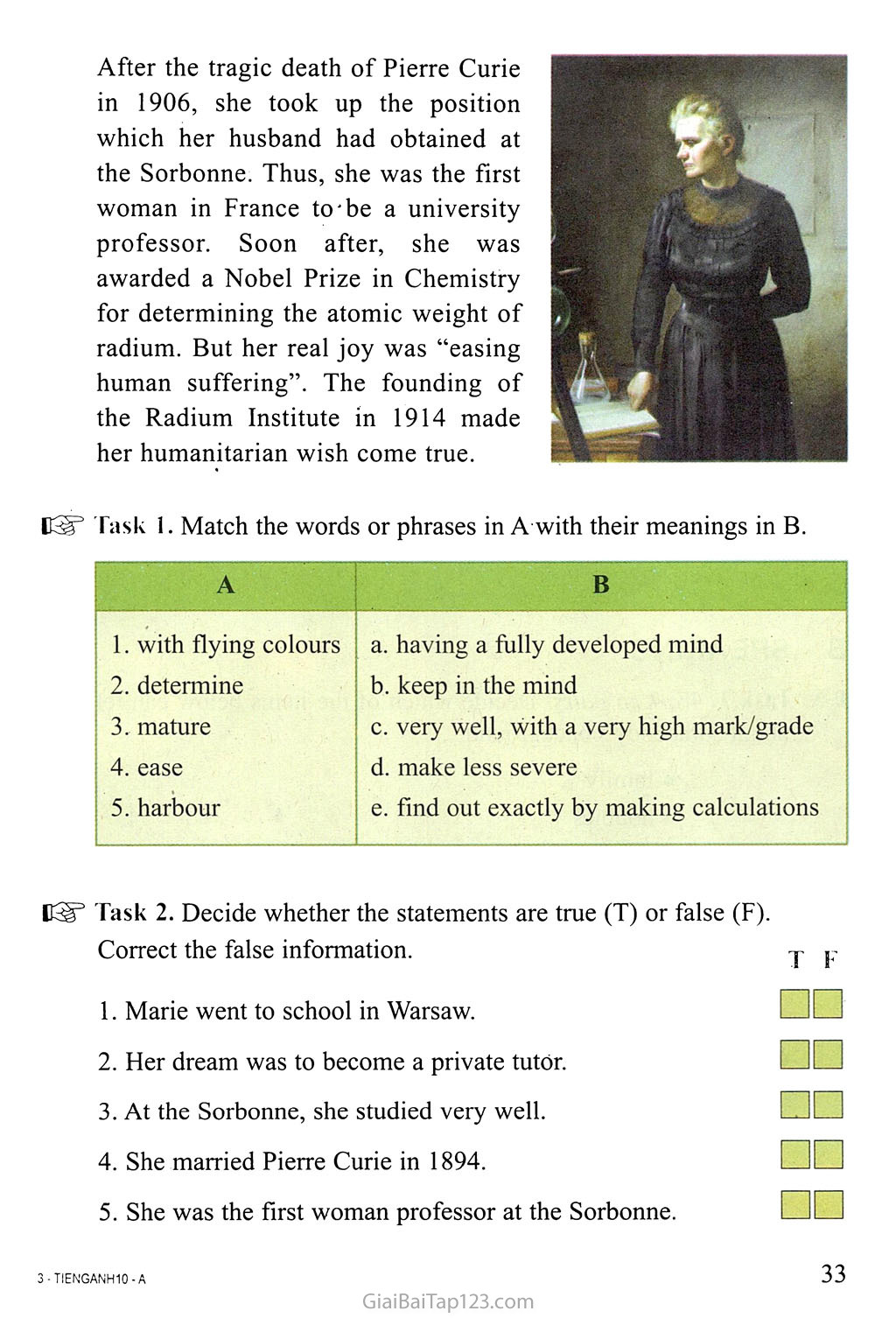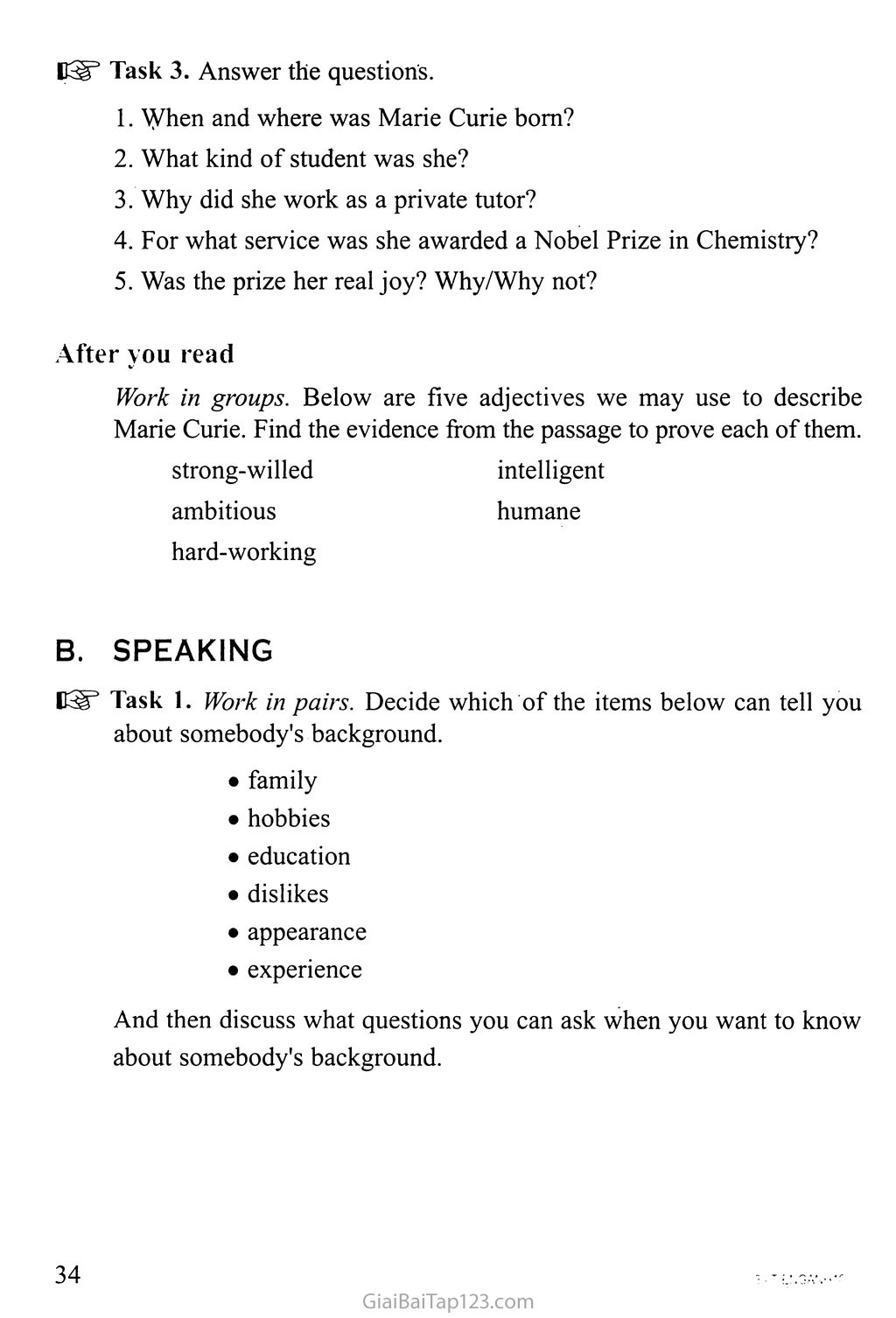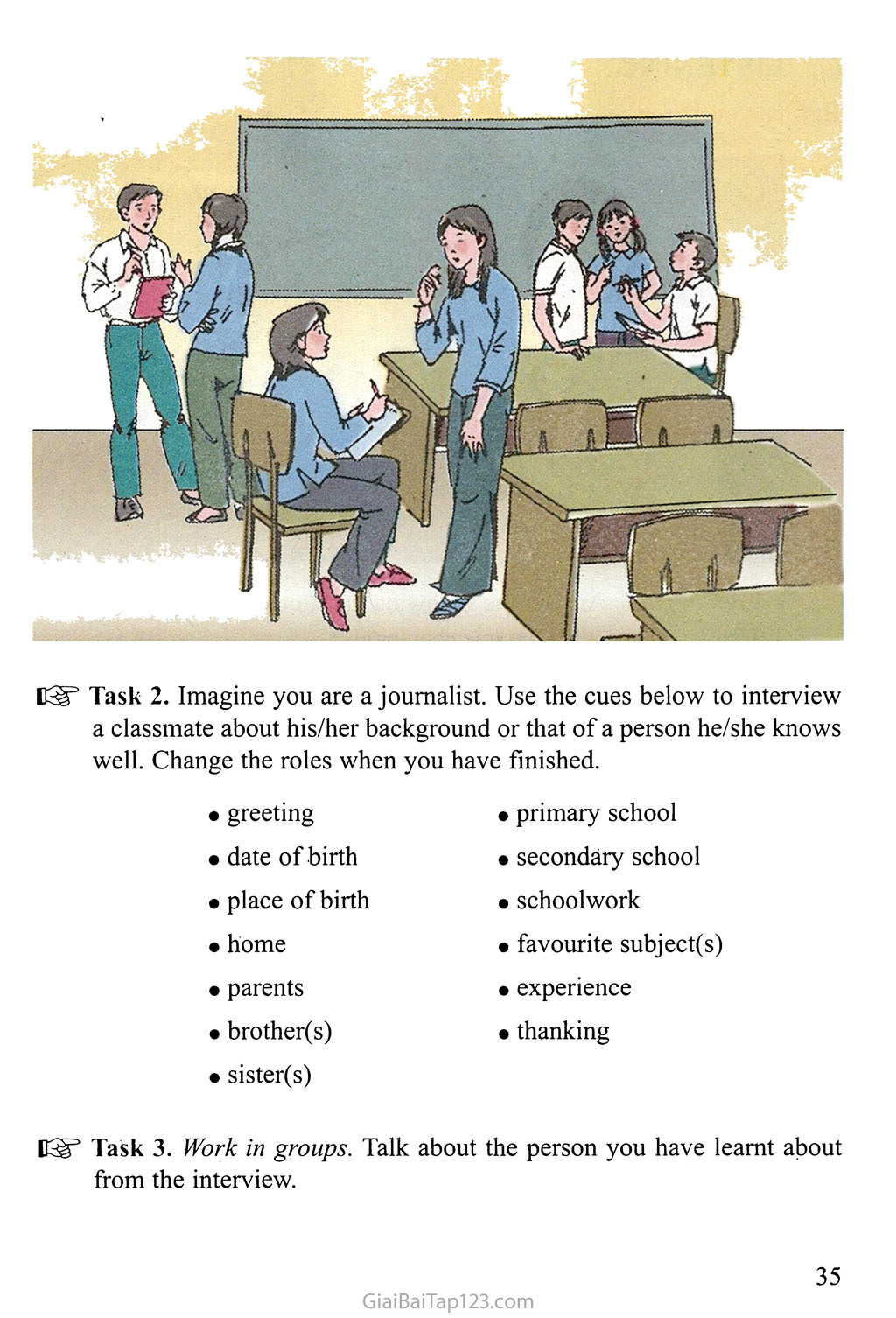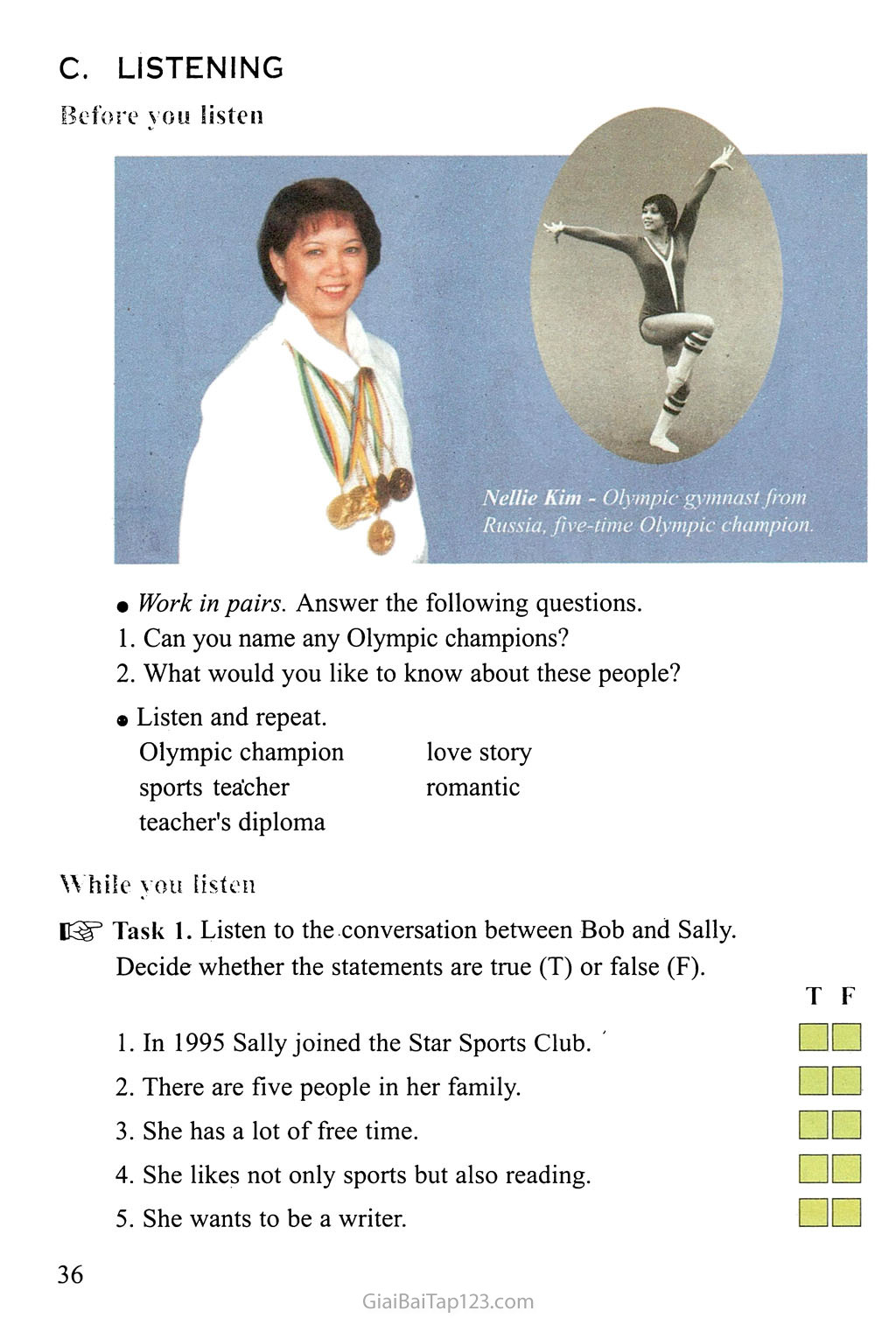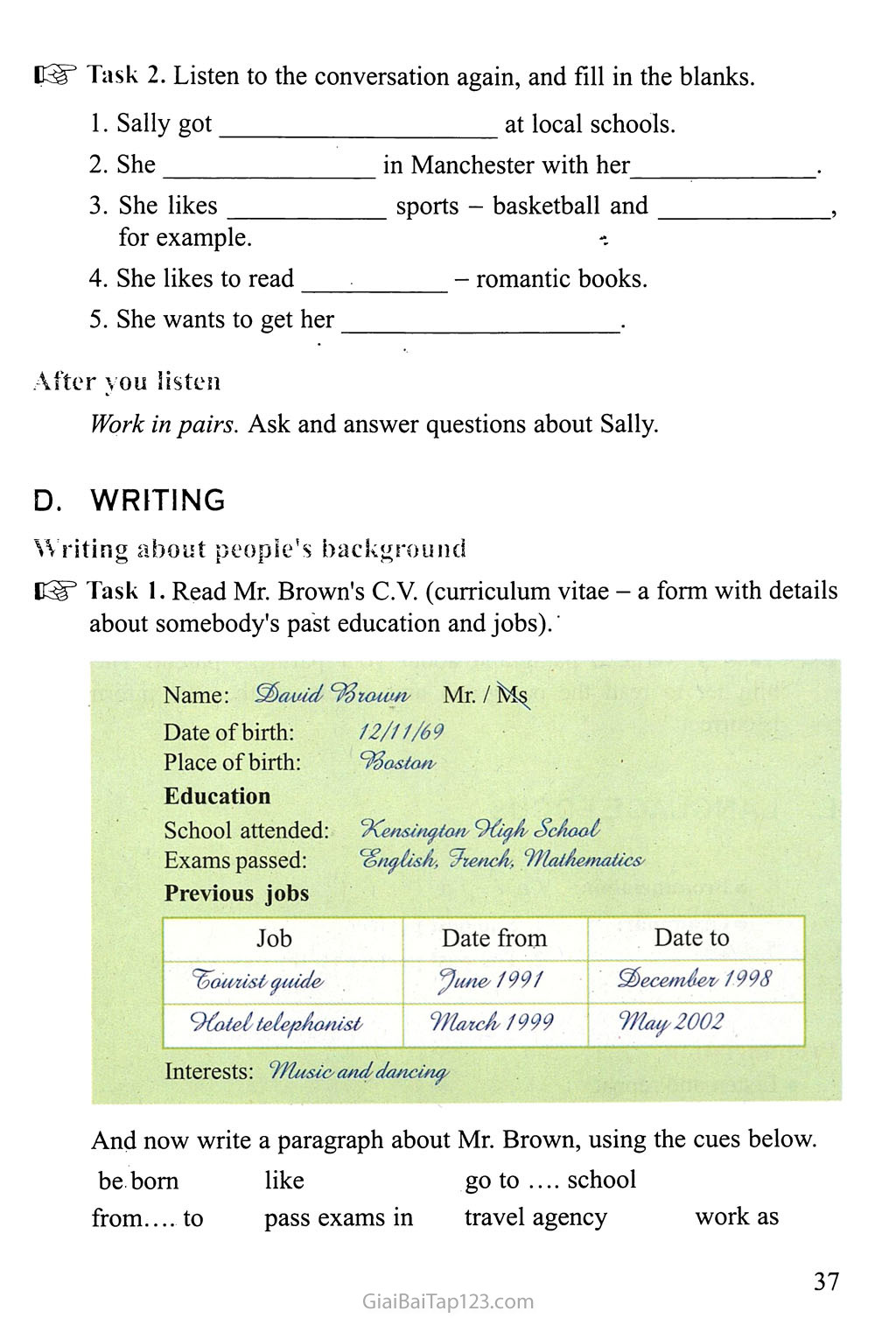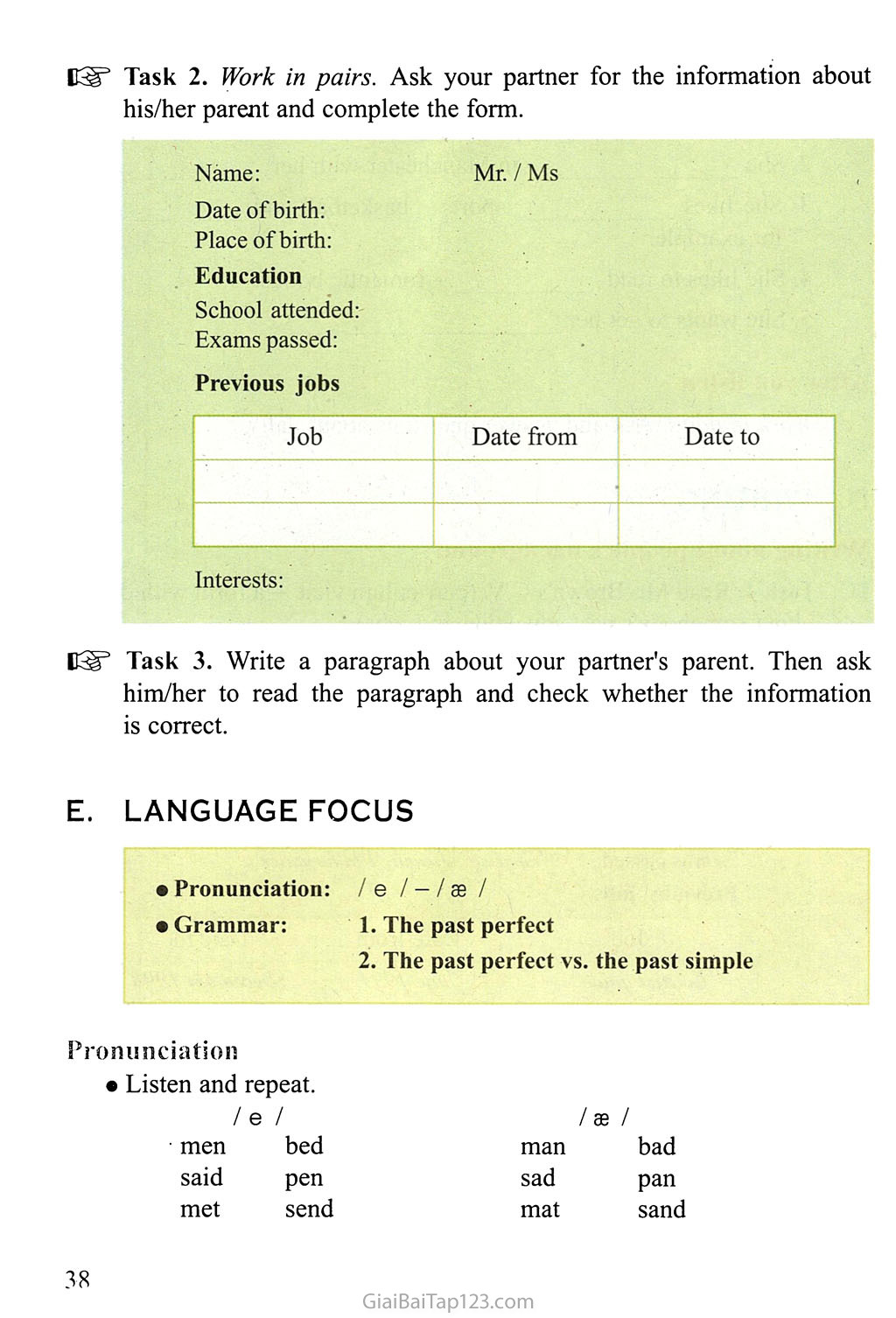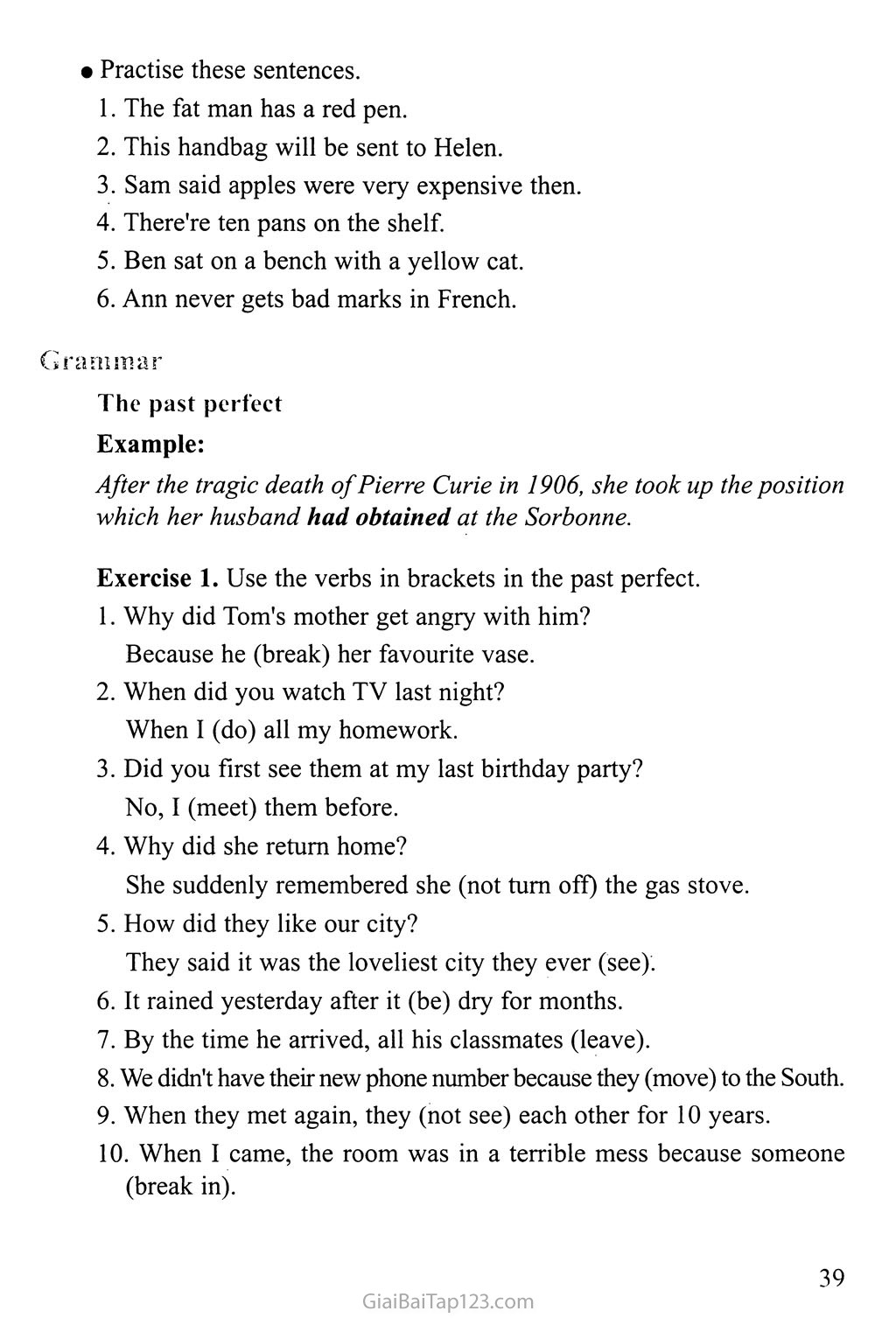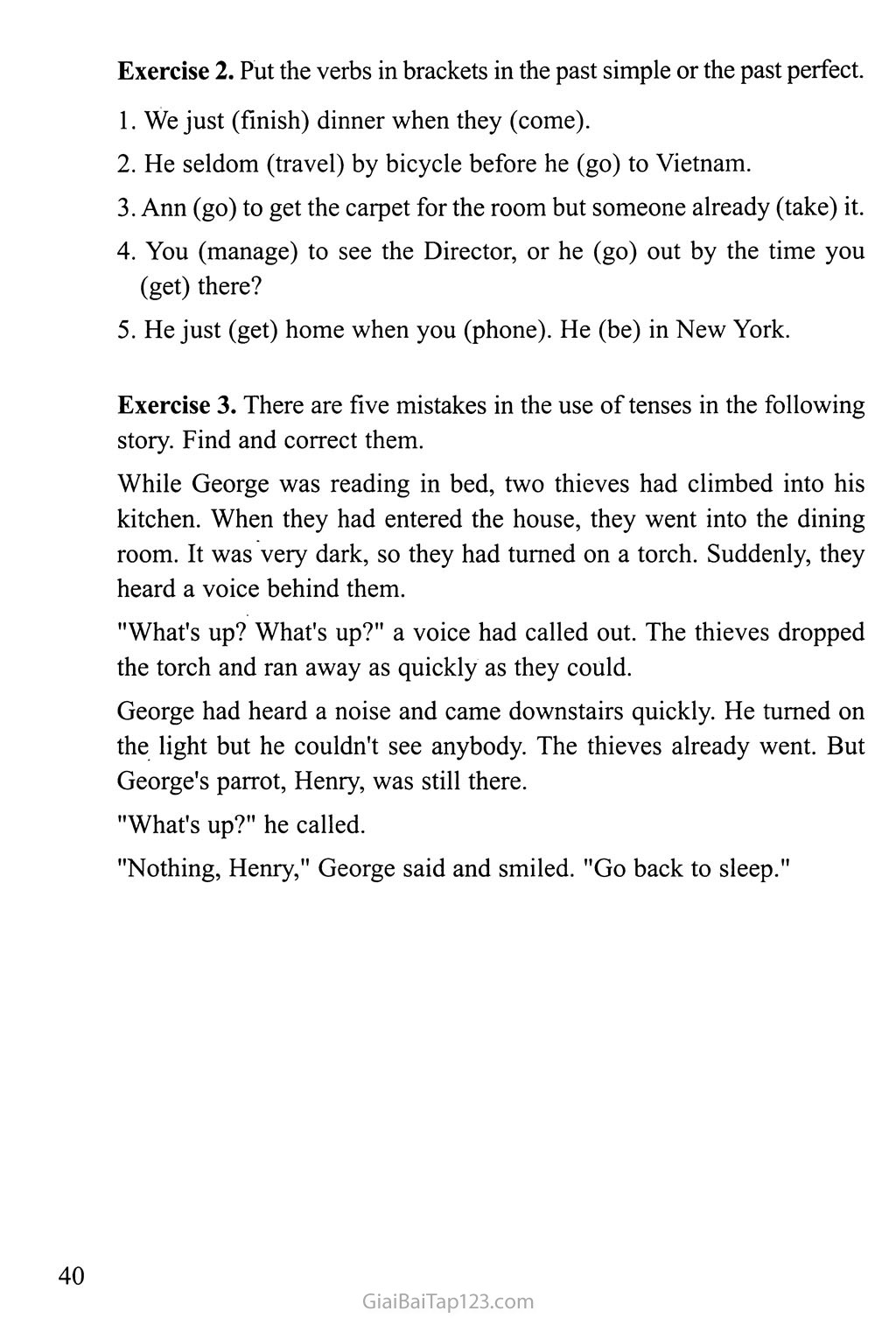SGK Tiếng Anh 10 - Unit 3: PEOLE’S BACKGROUND
PEOPLE’S BACKGROUND A. READING Before you read Work in pairs. Ask and answer the following questions. Can you name some scientists and their specialisations? Have you ever heard of Marie Curie? What do you know about her? While you read Read the passage and then do the tasks that follow. Marie Curie was bom in Warsaw on November 7th, 1867. She received general education in local schools and some scientific training from her father. As a brilliant and mature student, Marie harboured the dream of a scientific career, which was impossible for a woman at that time. To save money for a study tour abroad, she had to work as a private tutor, and her studies were interrupted. Finally in 1891, Marie, with very little money to live on, went to Paris to realise her dream at the Sorbonne. In spite of her difficult living conditions, she worked extremely hard. She earned a degree in Physics with flying colours, and went on to take another degree in Mathematics. She met Pierre Curie in the School of Physics in 1894 and a year later they got married. From then on, they worked together on their research. In 1903, Marie became the first woman to receive a PhD from the Sorbonne. After the tragic death of Pierre Curie in 1906, she took up the position which her husband had obtained at the Sorbonne. Thus, she was the first woman in France to be a university professor. Soon after, she was awarded a Nobel Prize in Chemistry for determining the atomic weight of radium. But her real joy was “easing human suffering”. The founding of the Radium Institute in 1914 made her humanitarian wish come true. Kir Task 1. Match the words or phrases in A with their meanings in B. A B 1. with flying colours a. having a fully developed mind 2. determine b. keep in the mind 3. mature c. very well, with a very high mark/grade 4. ease d. make less severe 5. harbour e. find out exactly by making calculations Task 2. Decide whether the statements are true (T) or false (F). Coưect the false information. Task 3. Answer the questions. When and where was Marie Curie bom? What kind of student was she? Why did she work as a private tutor? For what service was she awarded a Nobel Prize in Chemistry? Was the prize her real joy? Why/Why not? After you read Work in groups. Below are five adjectives we may use to describe Marie Curie. Find the evidence from the passage to prove each of them. intelligent humane strong-willed ambitious hard-working B. SPEAKING ESaC Task 1. Work in pairs. Decide which of the items below can tell you about somebody's background. family hobbies education dislikes appearance experience And then discuss what questions you can ask when you want to know about somebody's background. mmc Task 2. Imagine you are a journalist. Use the cues below to interview a classmate about his/her background or that of a person he/she knows well. Change the roles when you have finished. • greeting • primary school • date of birth • secondary school • place of birth • schoolwork • home • favourite subject(s) • parents • experience • brother(s) • thanking • sister(s) KẫT Task 3. Work in groups. Talk about the person you have learnt about from the interview. c. LISTENING Before you listen Work in pairs. Answer the following questions. Can you name any Olympic champions? What would you like to know about these people? Listen and repeat. Olympic champion love story sports tea'cher romantic teacher's diploma While you listen KIT Task 1. Listen to the conversation between Bob and Sally. Decide whether the statements are true (T) or false (F). In 1995 Sally joined the Star Sports Club. There are five people in her family. She has a lot of free time. She likes not only sports but also reading. She wants to be a writer. Ọ3 Task 2. Listen to the conversation again, and fill in the blanks. Sally got at local schools. She in Manchester with her . She likes sports - basketball and , for example. She likes to read - romantic books. She wants to get her . After you listen Work in pairs. Ask and answer questions about Sally. D. WRITING Writing about people’s background Kẫ3 Task 1. Read Mr. Brown's c.v. (curriculum vitae - a form with details about somebody's past education and jobs). Name: /Ếauid cW)iauMz Mr. I Ms Date of birth: 12/11/69 Place of birth: c/ẵostnn Education School attended: /Zeashiqtou /ủqiỉ cSc/ioo/ Exams passed: Jĩcnc/ĩ, lỉlat/iematics Previous jobs Job Date from Date to liotciisl (flti/a 1991 z/becem/eb 1998 /H/itet te/epnoni&t/ 7/la^z 1999 ///up2002 Interests: Itỉusi&a/uỊdaneiný/ And now write a paragraph about Mr. Brown, using the cues below, be bom like go to .... school from.... to pass exams in travel agency work as EdlT Task 2. Work in pairs. Ask your partner for the information about his/her parent and complete the form. Name: Mr. / Ms Date of birth: Place of birth: Education School attended: Exams passed: Previous jobs Job Date from Date to • 1 , 1 Interests: CdlT Task 3. Write a paragraph about your partner's parent. Then ask him/her to read the paragraph and check whether the information is correct. E. LANGUAGE FOCUS • Pronunciation: / e /-/ae / • Grammar: The past perfect The past perfect vs. the past simple Pronunciation • Listen and repeat. lei / se / men bed man bad said pen sad pan met send mat sand • Practise these sentences. The fat man has a red pen. This handbag will be sent to Helen. Sam said apples were very expensive then. There're ten pans on the shelf. Ben sat on a bench with a yellow cat. Ann never gets bad marks in French. Grammar The past perfect Example: After the tragic death of Pierre Curie in 1906, she took up the position which her husband had obtained at the Sorbonne. Exercise 1. Use the verbs in brackets in the past perfect. Why did Tom's mother get angry with him? Because he (break) her favourite vase. When did you watch TV last night? When I (do) all my homework. Did you first see them at my last birthday party? No, I (meet) them before. Why did she return home? She suddenly remembered she (not turn off) the gas stove. How did they like our city? They said it was the loveliest city they ever (see). It rained yesterday after it (be) dry for months. By the time he arrived, all his classmates (leave). We didn't have their new phone number because they (move) to the South. When they met again, they (not see) each other for 10 years. When I came, the room was in a terrible mess because someone (break in). Exercise 2. Put the verbs in brackets in the past simple or the past perfect. We just (finish) dinner when they (come). He seldom (travel) by bicycle before he (go) to Vietnam. Ann (go) to get the carpet for the room but someone already (take) it. You (manage) to see the Director, or he (go) out by the time you (get) there? He just (get) home when you (phone). He (be) in New York. Exercise 3. There are five mistakes in the use of tenses in the following story. Find and correct them. While George was reading in bed, two thieves had climbed into his kitchen. When they had entered the house, they went into the dining room. It was very dark, so they had turned on a torch. Suddenly, they heard a voice behind them. "What's up? What's up?" a voice had called out. The thieves dropped the torch and ran away as quickly as they could. George had heard a noise and came downstairs quickly. He turned on the light but he couldn't see anybody. The thieves already went. But George's parrot, Henry, was still there. "What's up?" he called. "Nothing, Henry," George said and smiled. "Go back to sleep."

